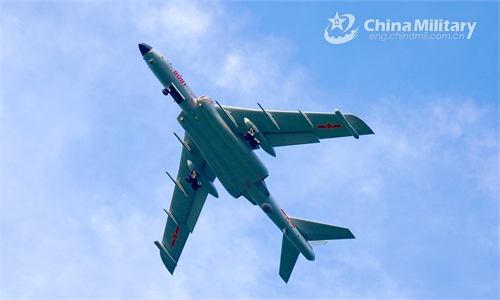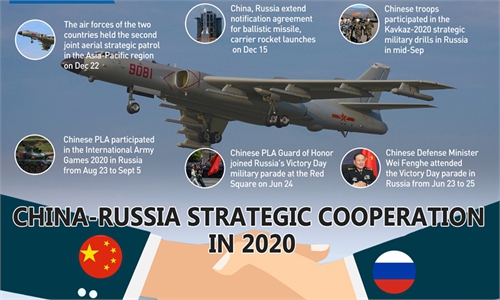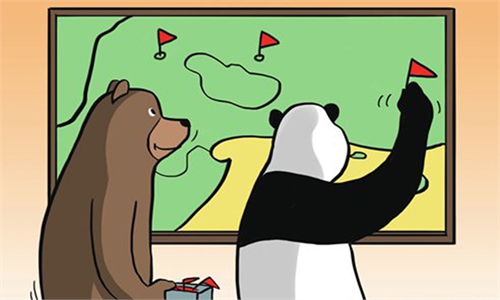China-Russia strategic ties to be strengthened, sending strong signal to new US govt
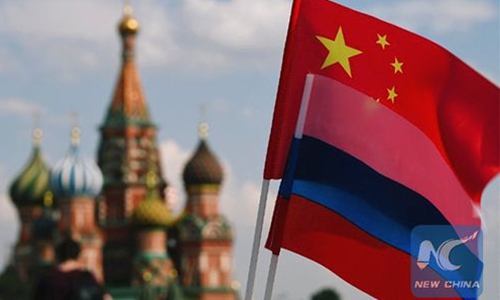
National flags of China and Russia are seen in the Red Square, Moscow, Russia.
China and Russia recently sent strong messages, through moves such as having joint aerial strategic patrols and criticizing US unilateralism together, to the US when the Trump administration is setting obstacles for the incoming Biden government to repair US relations with other countries.
After Joe Biden takes office, China-Russia-US trilateral relations will face some changes as Biden would put Moscow in the position as the biggest threat to US national security, but Chinese analysts said on Wednesday that the US won't take China out of its list of rivals.
The China-Russia strategic ties should remain close and strengthened to handle increasing pressure from the US, even if Biden might ease tensions with Beijing, analysts noted.
The more turbulent the world becomes, the more stable China-Russia relations should be, said Chinese State Councilor and Foreign Minister Wang Yi in a phone conversation with Russian Foreign Minister Sergei Lavrov on Tuesday, and they also slammed the suppression by the US against the two countries.
Wang said "the US is still wielding the stick of unilateral sanctions and going against the trend of the times, and will only leave more disgraceful records in the world."
Lavrov also expressed strong opposition to the US move to undermine multilateralism. He said China and Russia should resist US suppression, and make joint efforts to safeguard the common interests of the two sides and maintain international stability and cooperation.
Yang Jin, an associate research fellow at the Institute of Russian, Eastern European and Central Asian Studies of the Chinese Academy of Social Sciences, told the Global Times on Wednesday that US hostility toward China and Russia will not be changed even if Washington adjusts its priority to confront Russia, and the remarks of Wang and Lavrov have proved the unshakable mutual trust and their common understanding of the US.
"The China-Russia relationship is at its best in history. This is not because of current pressure from the US, but based on reciprocal demand and fundamental interests of the two countries. From the end of the Cold War to the present, the bilateral ties have experienced a series of changes in the international situation, but are increasingly solid," Yang noted.
But US suppression will definitely speed up China-Russia cooperation in the field of military and security, Yang further said.
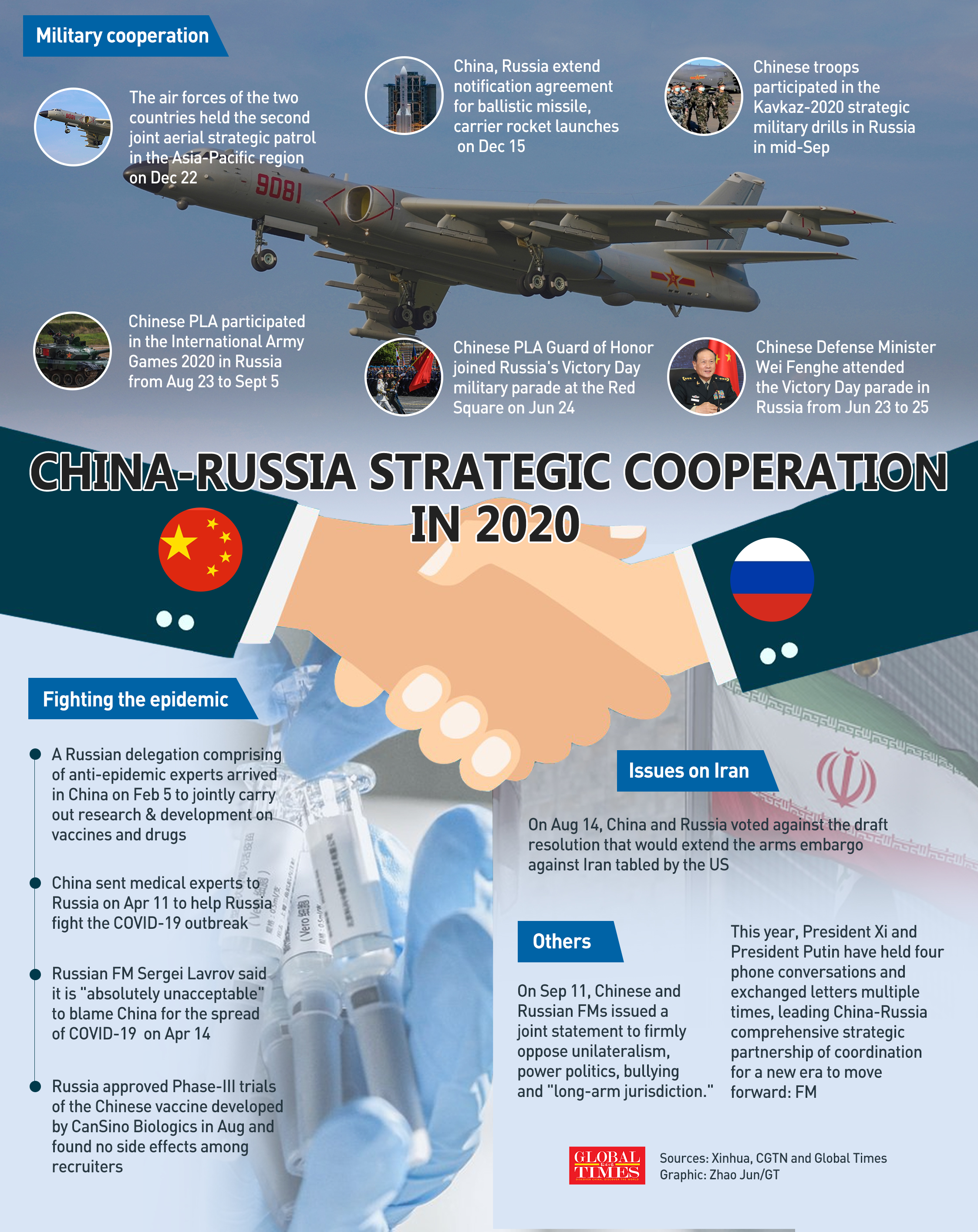
China-Russia strategic cooperation in 2020. Graphic: GT
Side by side, back to back
Also on Tuesday, the air forces of China and Russia held their second joint aerial strategic patrol in the Asia-Pacific region, following the first one in 2019.
According to information released by Japanese and South Korean defense authorities, the China and Russia military aircraft including H-6K and Tu-95 strategic bombers arrived in the Sea of Japan, where Russia has security concerns due to US presence, and the East China Sea where China has sovereignty disputes with Japan, as well as the Miyako Strait in the eastern region of Taiwan island, which is close to Okinawa with a US military base.
"This is a clear signal to the US. China and Russia's military deterrence can reach areas close to any US military base in the region," said a military expert at a Beijing-based military academy who requested anonymity.
Another example in the military field that shows high-level mutual strategic trust is that China and Russia on December 15 extended their agreement on launch notification of both countries' ballistic missiles and carrier rockets, which was signed in October 2009.
Not only in the Asian-Pacific region, but also in the Indian Ocean, the Middle East and central Asia, China and Russia conducted joint military operations in recent years to fight piracy, safeguard the peace and stability of the world, and protect other members of the international community from US hegemony.
In December 2019, China, Russia and Iran held a three-day joint naval drill in the Gulf of Oman amid heightened US-Iran tensions. On the Syrian civil war, China and Russia also have diplomatic cooperation at the UN Security Council to keep the situation from losing control in the face of Western intervention.
China and Russia also keep close coordination and firmly stand with each other to defend their core interests and strategic concerns, while Russia has always be supportive of China on affairs related to Hong Kong and Taiwan, where the US and its allies are provoking, and China has always supported Russia when the West pressures or sanctions Moscow on issues like Crimea and Syria.

Illustration: Liu Rui/GT
Military alliance?
A series of interactions and cooperation between China and Russia has raised concerns in the West, as some observers speculated that China-Russia partnership will be transformed into a military alliance in the future and this will bring a new Cold War to the world.
Wu Dahui, a professor of international relations and expert on China-Russia ties at Tsinghua University, told the Global Times on Wednesday that the West is holding double standards while criticizing or demonizing China-Russia cooperation.
"The US, for instance, has many allies in Asia and Europe and the US has even deployed weapons in other countries to threaten China and Russia. So it is unfair and unreasonable for the West to complain about China-Russia military cooperation," Wu noted.
Russian President Vladimir Putin said in October that a China-Russia military alliance is "possible," although both sides "in general" have no need for it, according to TASS.
Russia feels the threat from the US will be increased, so it wants to warn the US and its allies, to deter potential provocations from the West, said Chinese experts.
Wu said Biden will fix US ties with Europe, and NATO will increase military deployment in the west and southwest of Russia, adding that Russia is having more and more challenges with situation in its neighboring countries, so Russia needs more support from China.
"But a military alliance is not an option for both sides at the moment. This is more like a last option for the worst situation - when the US or another country launches a war that forces China and Russia to fight side by side," Yang said.
Li Haidong, a professor at the Institute of International Relations of China Foreign Affairs University, said that the military alliance is not flexible and will bring new problems, and the current strategic partnership is enough for the two sides to handle common challenges and keep flexible to serve their own interests.
"For instance, when China and India have tensions this year, Russia can act as a mediator. But if Russia is a Chinese ally, then India would have to stay away from Russia and stand closer with the US. When Russia has problem with Ukraine or some EU members, China would have difficulty maintaining its ties with Kiev and Europe if China has a military alliance with Russia. The military alliance is an outdated and very inflexible model of cooperation between major powers," Li noted.
The China-Russia cooperation not only focuses on military and security, but is very flexible and comprehensive also on the economy, politics, diplomacy, culture, science and technology, and public health.
At the Shanghai Cooperation Organization annual summit in November, Chinese and Russian national leaders, together with other member states, agreed to cooperate on the COVID-19 vaccine and the development of the digital economy.

